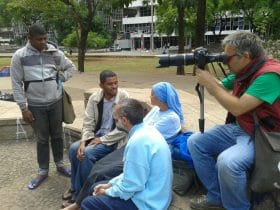
Feb 13, 2018 | Focolare Worldwide
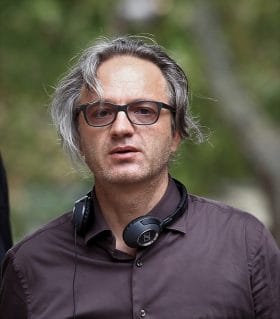 “I was only 12 when I met Chiara Lubich. If it hadn’t been for this friendship with her and for the charism of unity, I would not have persisted in such a strongly competitive environment full of quagmire. I have a deep gratitude for all those with whom I shared this challenge.” Fernando Muraca began his work as a theatre director and author after his university studies in Rome. After the success achieved in the direction of some episodes in two TV series, the debut in the world of cinema came along with a capital C. Among his most recent works we find “La Terra dei Santi” (The Land of Saints), an intense film on the role of women of the Mafia in Calabria, which received numberless awards and recognitions. Before a very attentive audience, Fernando recounted his story.
“I was only 12 when I met Chiara Lubich. If it hadn’t been for this friendship with her and for the charism of unity, I would not have persisted in such a strongly competitive environment full of quagmire. I have a deep gratitude for all those with whom I shared this challenge.” Fernando Muraca began his work as a theatre director and author after his university studies in Rome. After the success achieved in the direction of some episodes in two TV series, the debut in the world of cinema came along with a capital C. Among his most recent works we find “La Terra dei Santi” (The Land of Saints), an intense film on the role of women of the Mafia in Calabria, which received numberless awards and recognitions. Before a very attentive audience, Fernando recounted his story. 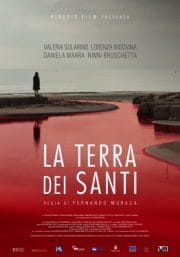 “One evening, I received an email from my friend, Giampietro, a missionary in Brazil. A long time ago I had shot for free, a documentary to collect funds for his community which engaged in saving women, men and children living under the bridges of São Paolo. In his email he asked if I was willing to leave my job for some years to document what was happening there. His mission then also addressed people who had fallen into the drug trap. The approach without prejudices and based on evangelical love, had already saved 10,000people destined to certain death. It was a result that really had to be documented.” Fernando continued – “In this email, Giampietro explained a backstory. A very rich man, after having put someone on his trail and having discovered who he really was, had decided to offer him half of his wealth. Having made a vow of poverty, Giampietro could not accept. But he had one wish: that I should go to Brazil to document the work of his mission. And so that man offered to pay for all the expenses, including the house bills in my absence.”
“One evening, I received an email from my friend, Giampietro, a missionary in Brazil. A long time ago I had shot for free, a documentary to collect funds for his community which engaged in saving women, men and children living under the bridges of São Paolo. In his email he asked if I was willing to leave my job for some years to document what was happening there. His mission then also addressed people who had fallen into the drug trap. The approach without prejudices and based on evangelical love, had already saved 10,000people destined to certain death. It was a result that really had to be documented.” Fernando continued – “In this email, Giampietro explained a backstory. A very rich man, after having put someone on his trail and having discovered who he really was, had decided to offer him half of his wealth. Having made a vow of poverty, Giampietro could not accept. But he had one wish: that I should go to Brazil to document the work of his mission. And so that man offered to pay for all the expenses, including the house bills in my absence.” 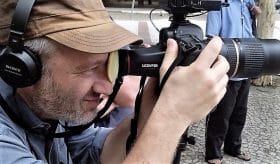 Fernando smiled: “It seems like a movie, I know, but it really happened.” And he continued: “I discussed it with my wife and our kids. It was a matter of leaving my work for two or three years, getting out of the business, putting my career at risk, with my wife having to attend to the family in my absence. She said she was ready to make this sacrifice if it would help to divulge the suffering of those people. And my eldest son said, ’Dad, we cannot look away.’ Also my friends encouraged me to accept. My film was just about to be shown in the cinemas, and I had to leave after 15 days. Pure folly. The feature film had a small distribution circuit. Without my presence to promote it, it may have died and I would have burnt my only chance for a career in the cinema world. But my son’s answer ‘We cannot look the other way’ was decisive for me.” “At the start, in São Paolo, it was almost impossible to shoot the film on the lives of people living under the bridges. They detested being photographed, much less filmed! To make them understand that I didn’t want to exploit their image I had to act like the missionaries. I also started to sleep under the bridges, to share their day, and in this way, they accepted. After a month, I returned to Italy for a break. The impact had been hard. I had to reflect about the material I was shooting and reorganize a new and longer trip. Meanwhile in Italy, all that I had foreseen really happened. Without funds for the promotion and without the presence of the director, my film was quickly disappearing from the cinema halls.
Fernando smiled: “It seems like a movie, I know, but it really happened.” And he continued: “I discussed it with my wife and our kids. It was a matter of leaving my work for two or three years, getting out of the business, putting my career at risk, with my wife having to attend to the family in my absence. She said she was ready to make this sacrifice if it would help to divulge the suffering of those people. And my eldest son said, ’Dad, we cannot look away.’ Also my friends encouraged me to accept. My film was just about to be shown in the cinemas, and I had to leave after 15 days. Pure folly. The feature film had a small distribution circuit. Without my presence to promote it, it may have died and I would have burnt my only chance for a career in the cinema world. But my son’s answer ‘We cannot look the other way’ was decisive for me.” “At the start, in São Paolo, it was almost impossible to shoot the film on the lives of people living under the bridges. They detested being photographed, much less filmed! To make them understand that I didn’t want to exploit their image I had to act like the missionaries. I also started to sleep under the bridges, to share their day, and in this way, they accepted. After a month, I returned to Italy for a break. The impact had been hard. I had to reflect about the material I was shooting and reorganize a new and longer trip. Meanwhile in Italy, all that I had foreseen really happened. Without funds for the promotion and without the presence of the director, my film was quickly disappearing from the cinema halls.  Then came an unexpected event. In Rome, on the last day of the projection, an important film critic showed up. The day after, on a national newspaper, in both the online and paper editions, two very positive reviews were published. They began sending the film to the film festivals in Italy and abroad. It won many prizes, some of which were very prestigious. Three years have passed since then. Upon terminating the work in Brazil, I started once again to take hold of the reins of my life. I didn’t shoot other films, but have many coming up on topics I had never had the courage to deal with. I wrote two novels and an essay on the experience of the “incarnation” of my ideals in art. I also developed a project to dedicate myself to the youth. In this “trade” one needs comfort, encouragement, and also reference points.” Chiara Favotti
Then came an unexpected event. In Rome, on the last day of the projection, an important film critic showed up. The day after, on a national newspaper, in both the online and paper editions, two very positive reviews were published. They began sending the film to the film festivals in Italy and abroad. It won many prizes, some of which were very prestigious. Three years have passed since then. Upon terminating the work in Brazil, I started once again to take hold of the reins of my life. I didn’t shoot other films, but have many coming up on topics I had never had the courage to deal with. I wrote two novels and an essay on the experience of the “incarnation” of my ideals in art. I also developed a project to dedicate myself to the youth. In this “trade” one needs comfort, encouragement, and also reference points.” Chiara Favotti
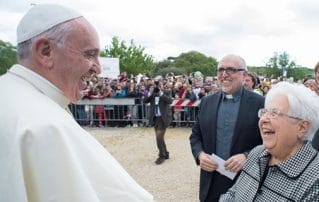
Feb 12, 2018 | Focolare Worldwide
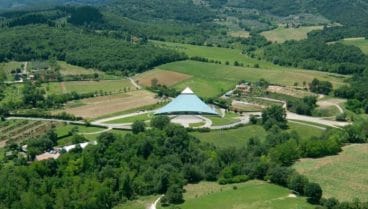 “We’re all enjoying this surprise together,” said Focolare president Maria Voce as she joyfully commented on the news of Pope Francis’s visit to Loppiano on May 10, 2018. The surprising news has raised great enthusiasm among the members and adherents of the Movement throughout the world, beginning with the town of Loppiano that will welcome the pope. Loppiano is located near Florence, Italy. It was the hope of Focolare foundress, Chiara Lubich, that it would be a real city, with schools, businesses, training centres, universities and business parks. It’s a “special” place a laboratory of community Gospel living. A thousand people from 65 countries of all ages, backgrounds and religions live in Loppiano. They strive to build universal brotherhood through daily practice of the Gospel and Loppiano’s “law” of mutual love. It’s a place for putting into practice the charism of unity – which is the spirituality of the Movement – and for responding to Jesus’s testament: “that all be one” (Jn 21).
“We’re all enjoying this surprise together,” said Focolare president Maria Voce as she joyfully commented on the news of Pope Francis’s visit to Loppiano on May 10, 2018. The surprising news has raised great enthusiasm among the members and adherents of the Movement throughout the world, beginning with the town of Loppiano that will welcome the pope. Loppiano is located near Florence, Italy. It was the hope of Focolare foundress, Chiara Lubich, that it would be a real city, with schools, businesses, training centres, universities and business parks. It’s a “special” place a laboratory of community Gospel living. A thousand people from 65 countries of all ages, backgrounds and religions live in Loppiano. They strive to build universal brotherhood through daily practice of the Gospel and Loppiano’s “law” of mutual love. It’s a place for putting into practice the charism of unity – which is the spirituality of the Movement – and for responding to Jesus’s testament: “that all be one” (Jn 21).  It was sensational news for the little city: “One second after the announcement by Maria Voce,” they tell us from Loppiano, “the news spread among the residents of the little city and was spread on the social networks around the world with a shower of joyful and surprised posts; it was like an atomic explosion that just blew us away.” At the announcement of the visit, Maria Voce remarked: “We’d like the pope to find the people of Chiara who live the Gospel and are bound to each other solely by mutual love, so that he sees a reflection of the Trinity on earth in the little city.” As for preparing the visit, she pointed out that only a hundred days remain to live and intensify our prayers “so that everything goes as well as possible and there won’t be any insurmountable obstacles; but mostly to intensify our life of Gospel love so that we can really be the living Word.” The Focolare president was also overjoyed about the pope’s visit to the Nomadelfia community, founded by Father Zeno Saltini in Grosseto, Italy. The pope will visit them before he visits Loppiano: “We know that the pope isn’t only visiting Loppiano. His visit to Nomadelfia is scheduled for the morning. Since we’re geographically close, our two communities have been linked by years of friendship and we have in common the same belief in the centrality of the Gospel and the commitment to universal brotherhood and working in favour of the least of these.In recent times many joyfully recall the participation of a group of young people from Nomadelfia at the annual youth fest held in Loppiano on the 1st of May, which has traditionally drawn teenagers to Loppiano from all over Italy.
It was sensational news for the little city: “One second after the announcement by Maria Voce,” they tell us from Loppiano, “the news spread among the residents of the little city and was spread on the social networks around the world with a shower of joyful and surprised posts; it was like an atomic explosion that just blew us away.” At the announcement of the visit, Maria Voce remarked: “We’d like the pope to find the people of Chiara who live the Gospel and are bound to each other solely by mutual love, so that he sees a reflection of the Trinity on earth in the little city.” As for preparing the visit, she pointed out that only a hundred days remain to live and intensify our prayers “so that everything goes as well as possible and there won’t be any insurmountable obstacles; but mostly to intensify our life of Gospel love so that we can really be the living Word.” The Focolare president was also overjoyed about the pope’s visit to the Nomadelfia community, founded by Father Zeno Saltini in Grosseto, Italy. The pope will visit them before he visits Loppiano: “We know that the pope isn’t only visiting Loppiano. His visit to Nomadelfia is scheduled for the morning. Since we’re geographically close, our two communities have been linked by years of friendship and we have in common the same belief in the centrality of the Gospel and the commitment to universal brotherhood and working in favour of the least of these.In recent times many joyfully recall the participation of a group of young people from Nomadelfia at the annual youth fest held in Loppiano on the 1st of May, which has traditionally drawn teenagers to Loppiano from all over Italy.
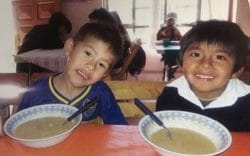
Feb 9, 2018 | Focolare Worldwide
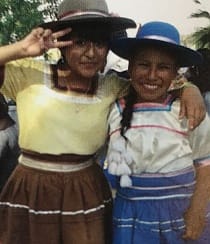 My family is composed of me, my sister and my mother who raised us on her own. We went through some very critical moments. My mother tried hard to find work. Then there was some friction with the landlady, because we didn’t have money for the rent. It was quite a heavy cross for my mother to manage the little money she earned. Therefore, the support we received through the Focolare Movement’s New Families Association was very important. Then the Centro Rincón de Luz was opened on the south side of our city, Cochabamba, in which scholastic support was being offered ever day, along with a hot meal, to children and teenagers who attended the local school. That centre was a huge help to me. It made me smile again and gave me some important formation. We were like one big family where our teachers were often like second parents. Thanks to the people who had faith in me, I can proudly say that I completed my course of study with good results and am in my first semester of university.I’ll soon be a professional, and I’ll try to extend some of the help I received to the to the children who are now at the centre.
My family is composed of me, my sister and my mother who raised us on her own. We went through some very critical moments. My mother tried hard to find work. Then there was some friction with the landlady, because we didn’t have money for the rent. It was quite a heavy cross for my mother to manage the little money she earned. Therefore, the support we received through the Focolare Movement’s New Families Association was very important. Then the Centro Rincón de Luz was opened on the south side of our city, Cochabamba, in which scholastic support was being offered ever day, along with a hot meal, to children and teenagers who attended the local school. That centre was a huge help to me. It made me smile again and gave me some important formation. We were like one big family where our teachers were often like second parents. Thanks to the people who had faith in me, I can proudly say that I completed my course of study with good results and am in my first semester of university.I’ll soon be a professional, and I’ll try to extend some of the help I received to the to the children who are now at the centre.  I’d also like to open a place for the people who live on the streets, helping them to find a way forward. I now know that you can change the life of a child and point him or her in the direction of a better life. That’s why I’m asking everybody to help: Together we can do it! In my case, the most important thing wasn’t just the financial support, but the faith they had in me, which has been a seed of hope, a spark of light that’s lit not only in the children, but also in their parents. Source: Teens
I’d also like to open a place for the people who live on the streets, helping them to find a way forward. I now know that you can change the life of a child and point him or her in the direction of a better life. That’s why I’m asking everybody to help: Together we can do it! In my case, the most important thing wasn’t just the financial support, but the faith they had in me, which has been a seed of hope, a spark of light that’s lit not only in the children, but also in their parents. Source: Teens
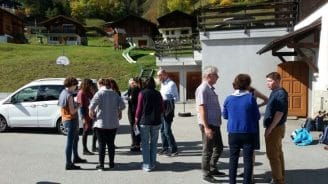
Feb 7, 2018 | Focolare Worldwide
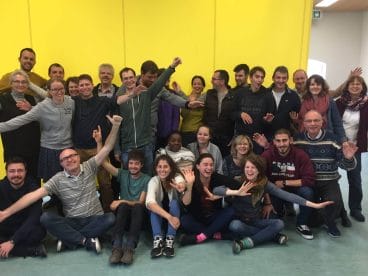 What drives a group of young people aged 18 to 34 years, from the three linguistic regions of Switzerland, to spend some days in the mountains together with eight focolare men and women, a couple of married focolarini and a priest? “The scope of “Behind the Scenes of the Focolare”, a weekend held in the splendid background of the Valais Alps, was not only to enjoy nature, but also to ask oneself, immersed in an ideal environment, a series of essential questions on the life one has lived so far and the years lying ahead. And among such queries was: What path shall I take? This question is often not easy to answer, especially when there are extraordinary and often unrepeatable possibilities from which one can choose. To consciously undertake one – the organizers thought – that it would be helpful to turn down the volume of daily vicissitudes and find a place where it is easier to listen to a suggestion, often whispered to one’s heart. “This is how we got the idea of spending a weekend together, where one can express oneself freely and sincerely, and where Jesus can speak out in the intimacy of one’s heart. A mix of deep reflection and community life, consisting of walks, games, clearing, coking, prayer, to express at best the beauty and also the “normality” of following His call, also today.”
What drives a group of young people aged 18 to 34 years, from the three linguistic regions of Switzerland, to spend some days in the mountains together with eight focolare men and women, a couple of married focolarini and a priest? “The scope of “Behind the Scenes of the Focolare”, a weekend held in the splendid background of the Valais Alps, was not only to enjoy nature, but also to ask oneself, immersed in an ideal environment, a series of essential questions on the life one has lived so far and the years lying ahead. And among such queries was: What path shall I take? This question is often not easy to answer, especially when there are extraordinary and often unrepeatable possibilities from which one can choose. To consciously undertake one – the organizers thought – that it would be helpful to turn down the volume of daily vicissitudes and find a place where it is easier to listen to a suggestion, often whispered to one’s heart. “This is how we got the idea of spending a weekend together, where one can express oneself freely and sincerely, and where Jesus can speak out in the intimacy of one’s heart. A mix of deep reflection and community life, consisting of walks, games, clearing, coking, prayer, to express at best the beauty and also the “normality” of following His call, also today.” 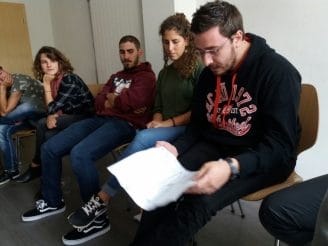 “Behind the scenes” of focolare life lies a personal call of God to achieve a community of laity, virgins and married people (each according to their status), fully immersed in the world, but imbued with the spiritual presence of Jesus among them, fruit of mutual love. It is a “presence” that wishes to bring to the world, with the objective and perspective of unity among people and societies, a more fraternal and united world that respects diversity. Some of the youths present had never investigated this possibility. Others had already decided to form a family, while others still had not posed the issue. But all had the desire to deepen a personal rapport with God and know more about this particular way of coexistence based on the model of the family of Nazareth, born from the charism of Chiara Lubich. “You live in the midst of society, and you don’t have a convent that protects you, how do you manage?” “Great, but isn’t it too difficult?” “What does it mean to follow Jesus today?” Many questions came up spontaneously and many answers were given, starting from personal experiences and the group meditations on the articles on the evangelical spirituality of unity.
“Behind the scenes” of focolare life lies a personal call of God to achieve a community of laity, virgins and married people (each according to their status), fully immersed in the world, but imbued with the spiritual presence of Jesus among them, fruit of mutual love. It is a “presence” that wishes to bring to the world, with the objective and perspective of unity among people and societies, a more fraternal and united world that respects diversity. Some of the youths present had never investigated this possibility. Others had already decided to form a family, while others still had not posed the issue. But all had the desire to deepen a personal rapport with God and know more about this particular way of coexistence based on the model of the family of Nazareth, born from the charism of Chiara Lubich. “You live in the midst of society, and you don’t have a convent that protects you, how do you manage?” “Great, but isn’t it too difficult?” “What does it mean to follow Jesus today?” Many questions came up spontaneously and many answers were given, starting from personal experiences and the group meditations on the articles on the evangelical spirituality of unity.  Kati and Istvan, a married couple, shared their own joys, difficulties and fundamental choices of their family. “I was deeply struck by the depth of the themes discussed even if I did not know you,” said one of the boys. “I came with a lot of questions and found many answers,” a girl said upon returning home. Peter, a priest remarked; “This was an unexpected weekend. Some of the boys expressed the desire to continue such sessions. This, to my mind, was the most important message of the two days spent together; we live for you and with you, in the uncertainty of the choice to make in life, but in the certainty of no longer being alone in this quest.”
Kati and Istvan, a married couple, shared their own joys, difficulties and fundamental choices of their family. “I was deeply struck by the depth of the themes discussed even if I did not know you,” said one of the boys. “I came with a lot of questions and found many answers,” a girl said upon returning home. Peter, a priest remarked; “This was an unexpected weekend. Some of the boys expressed the desire to continue such sessions. This, to my mind, was the most important message of the two days spent together; we live for you and with you, in the uncertainty of the choice to make in life, but in the certainty of no longer being alone in this quest.”

Feb 2, 2018 | Focolare Worldwide
 The Focolare Movement has received the surprising news of Pope Francis’s visit to Loppiano, a little town of the Movement, scheduled for 10th May 2018. Focolare President, Maria Voce, will receive the Pope, together with the local Ordinary, Rt Rev. Mario Meini, Bishop of Fiesole. Maria Voce’s immediate response was, “This surprising news has given me deep joy. It is a great honour for the Focolare Movement to welcome a Pope into our midst, in one of our little towns. Above all, it prompts us to intensify our commitment to live love and unity, being rooted in the Gospel. All we want is that the Pope should find this breath of Gospel life on his arrival at Loppiano. Now that the news is spreading to the Movement’s communities, this joy and commitment will be shared all over the world”. Loppiano is the first of the Focolare’s little towns, established in 1964 on the Tuscan hills not far from Florence. Currently, there are 850 residents: men and women, families, young people and children, priests and religious from 65 countries and all 5 continents. More than half live there permanently while others are attending one of the 12 international schools during which they spend 6-18 months at Loppiano. This multi-national and multi-cultural population has made its own the law of mutual love. This makes Loppiano become a workshop of shared living among people of different ages, backgrounds, traditions, cultures and religious faiths.
The Focolare Movement has received the surprising news of Pope Francis’s visit to Loppiano, a little town of the Movement, scheduled for 10th May 2018. Focolare President, Maria Voce, will receive the Pope, together with the local Ordinary, Rt Rev. Mario Meini, Bishop of Fiesole. Maria Voce’s immediate response was, “This surprising news has given me deep joy. It is a great honour for the Focolare Movement to welcome a Pope into our midst, in one of our little towns. Above all, it prompts us to intensify our commitment to live love and unity, being rooted in the Gospel. All we want is that the Pope should find this breath of Gospel life on his arrival at Loppiano. Now that the news is spreading to the Movement’s communities, this joy and commitment will be shared all over the world”. Loppiano is the first of the Focolare’s little towns, established in 1964 on the Tuscan hills not far from Florence. Currently, there are 850 residents: men and women, families, young people and children, priests and religious from 65 countries and all 5 continents. More than half live there permanently while others are attending one of the 12 international schools during which they spend 6-18 months at Loppiano. This multi-national and multi-cultural population has made its own the law of mutual love. This makes Loppiano become a workshop of shared living among people of different ages, backgrounds, traditions, cultures and religious faiths.
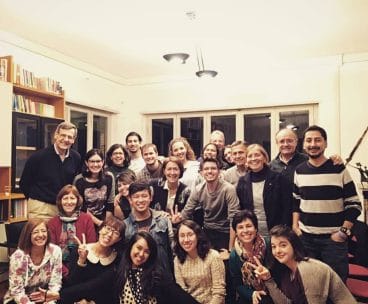
Feb 2, 2018 | Focolare Worldwide
 “I’m working in Italy working with some other young people my age for the upcoming 2018 Genfest in Manila.” Preparations are in full swing for the first Genfest ever held outside Europe. Nelson joined the international group of teenagers who were already at work, ever since he arrived in Italy in 2017 – first in Loppiano and then at the international Gen2 centre near Rome where we are interviewing him. “I come from El Salvador, the least expansive but most populated country in Central America. It’s a beautiful place, but has recently been hit by a civil war that lasted for 12 years and ended in 1992, leaving the country completely destroyed.” Nelson explains; “After the end of the war, many families found themselves looking for a place to settle and many parents emigrated, leaving their children with relatives or anyone who would take them in. But in the midst of the overall bewilderment, this resulted in an entire generation of boys and teenagers who were left without guidance or direction, or even anyone to show some genuine interest in them. To that was added the complication of getting the money earned outside the country to its destination in El Salvador. Many of these boys were left deprived of everything and began to leave school and roam the streets, seeking in delinquency the attention that they hadn’t found anwhere else. In short, recruiting adolescents, some of them quite young, they formed into many criminall groups who became more and more rooted and dangerous, each with its own name and symbolism, rituals and gestures.” “To uproot what seemed at first a simple problem to solve, the government launched a plan, which was also very violent, inprisoning anyone with a tatoo. The result was an unprecedented escalation of ferocious violence from the gangs that began to kill for no reason, to threaten more and more young people, forcing them into their groups. Before moving to Italy, I worked in San Miguel at a Salesian school which was dedicated to more than a thousand students who come from outside the city every week. Many of them have serious family problems, or parents enlisted in criminal groups, or even worse, they themselves are on the verge of joining. I taught physical education. One day, during swimming class, a boy wanted to jump into the pool without removing his shirt, even though that was against the rules. He was nervous and afraid. So I took him aside so that I could talk to him alone. I asked him the reason why. He told me that he had had himself tattooed with the symbol of a group, and didn’t want anyone to know. I gave him permissioin to get into the water with the shirt on, but afterwards, in class, I returned to the topic and we began to talk about ways of finding alternatives to criminality. Then, for the rest of the year, we tried to explain to him all of us together, that there’s always a way out, another way to live, far from violence. A few months later I saw him proudly wearing a work uniform, he had managed to leave the group which, thanks be to God had left him in peace. Now he’s providing for his family. ‘Thanks Prof. Thanks to all of you who helped me to realize that I could be a different person from what I started out to be. Thank you mostly for helping me to change the direction of my life.’” Chiara Favotti
“I’m working in Italy working with some other young people my age for the upcoming 2018 Genfest in Manila.” Preparations are in full swing for the first Genfest ever held outside Europe. Nelson joined the international group of teenagers who were already at work, ever since he arrived in Italy in 2017 – first in Loppiano and then at the international Gen2 centre near Rome where we are interviewing him. “I come from El Salvador, the least expansive but most populated country in Central America. It’s a beautiful place, but has recently been hit by a civil war that lasted for 12 years and ended in 1992, leaving the country completely destroyed.” Nelson explains; “After the end of the war, many families found themselves looking for a place to settle and many parents emigrated, leaving their children with relatives or anyone who would take them in. But in the midst of the overall bewilderment, this resulted in an entire generation of boys and teenagers who were left without guidance or direction, or even anyone to show some genuine interest in them. To that was added the complication of getting the money earned outside the country to its destination in El Salvador. Many of these boys were left deprived of everything and began to leave school and roam the streets, seeking in delinquency the attention that they hadn’t found anwhere else. In short, recruiting adolescents, some of them quite young, they formed into many criminall groups who became more and more rooted and dangerous, each with its own name and symbolism, rituals and gestures.” “To uproot what seemed at first a simple problem to solve, the government launched a plan, which was also very violent, inprisoning anyone with a tatoo. The result was an unprecedented escalation of ferocious violence from the gangs that began to kill for no reason, to threaten more and more young people, forcing them into their groups. Before moving to Italy, I worked in San Miguel at a Salesian school which was dedicated to more than a thousand students who come from outside the city every week. Many of them have serious family problems, or parents enlisted in criminal groups, or even worse, they themselves are on the verge of joining. I taught physical education. One day, during swimming class, a boy wanted to jump into the pool without removing his shirt, even though that was against the rules. He was nervous and afraid. So I took him aside so that I could talk to him alone. I asked him the reason why. He told me that he had had himself tattooed with the symbol of a group, and didn’t want anyone to know. I gave him permissioin to get into the water with the shirt on, but afterwards, in class, I returned to the topic and we began to talk about ways of finding alternatives to criminality. Then, for the rest of the year, we tried to explain to him all of us together, that there’s always a way out, another way to live, far from violence. A few months later I saw him proudly wearing a work uniform, he had managed to leave the group which, thanks be to God had left him in peace. Now he’s providing for his family. ‘Thanks Prof. Thanks to all of you who helped me to realize that I could be a different person from what I started out to be. Thank you mostly for helping me to change the direction of my life.’” Chiara Favotti

 “I was only 12 when I met Chiara Lubich. If it hadn’t been for this friendship with her and for the charism of unity, I would not have persisted in such a strongly competitive environment full of quagmire. I have a deep gratitude for all those with whom I shared this challenge.” Fernando Muraca began his work as a theatre director and author after his university studies in Rome. After the success achieved in the direction of some episodes in two TV series, the debut in the world of cinema came along with a capital C. Among his most recent works we find “La Terra dei Santi” (The Land of Saints), an intense film on the role of women of the Mafia in Calabria, which received numberless awards and recognitions. Before a very attentive audience, Fernando recounted his story.
“I was only 12 when I met Chiara Lubich. If it hadn’t been for this friendship with her and for the charism of unity, I would not have persisted in such a strongly competitive environment full of quagmire. I have a deep gratitude for all those with whom I shared this challenge.” Fernando Muraca began his work as a theatre director and author after his university studies in Rome. After the success achieved in the direction of some episodes in two TV series, the debut in the world of cinema came along with a capital C. Among his most recent works we find “La Terra dei Santi” (The Land of Saints), an intense film on the role of women of the Mafia in Calabria, which received numberless awards and recognitions. Before a very attentive audience, Fernando recounted his story.  “One evening, I received an email from my friend, Giampietro, a missionary in Brazil. A long time ago I had shot for free, a documentary to collect funds for his community which engaged in saving women, men and children living under the bridges of São Paolo. In his email he asked if I was willing to leave my job for some years to document what was happening there. His mission then also addressed people who had fallen into the drug trap. The approach without prejudices and based on evangelical love, had already saved 10,000people destined to certain death. It was a result that really had to be documented.” Fernando continued – “In this email, Giampietro explained a backstory. A very rich man, after having put someone on his trail and having discovered who he really was, had decided to offer him half of his wealth. Having made a vow of poverty, Giampietro could not accept. But he had one wish: that I should go to Brazil to document the work of his mission. And so that man offered to pay for all the expenses, including the house bills in my absence.”
“One evening, I received an email from my friend, Giampietro, a missionary in Brazil. A long time ago I had shot for free, a documentary to collect funds for his community which engaged in saving women, men and children living under the bridges of São Paolo. In his email he asked if I was willing to leave my job for some years to document what was happening there. His mission then also addressed people who had fallen into the drug trap. The approach without prejudices and based on evangelical love, had already saved 10,000people destined to certain death. It was a result that really had to be documented.” Fernando continued – “In this email, Giampietro explained a backstory. A very rich man, after having put someone on his trail and having discovered who he really was, had decided to offer him half of his wealth. Having made a vow of poverty, Giampietro could not accept. But he had one wish: that I should go to Brazil to document the work of his mission. And so that man offered to pay for all the expenses, including the house bills in my absence.”  Fernando smiled: “It seems like a movie, I know, but it really happened.” And he continued: “I discussed it with my wife and our kids. It was a matter of leaving my work for two or three years, getting out of the business, putting my career at risk, with my wife having to attend to the family in my absence. She said she was ready to make this sacrifice if it would help to divulge the suffering of those people. And my eldest son said, ’Dad, we cannot look away.’ Also my friends encouraged me to accept. My film was just about to be shown in the cinemas, and I had to leave after 15 days. Pure folly. The feature film had a small distribution circuit. Without my presence to promote it, it may have died and I would have burnt my only chance for a career in the cinema world. But my son’s answer ‘We cannot look the other way’ was decisive for me.” “At the start, in São Paolo, it was almost impossible to shoot the film on the lives of people living under the bridges. They detested being photographed, much less filmed! To make them understand that I didn’t want to exploit their image I had to act like the missionaries. I also started to sleep under the bridges, to share their day, and in this way, they accepted. After a month, I returned to Italy for a break. The impact had been hard. I had to reflect about the material I was shooting and reorganize a new and longer trip. Meanwhile in Italy, all that I had foreseen really happened. Without funds for the promotion and without the presence of the director, my film was quickly disappearing from the cinema halls.
Fernando smiled: “It seems like a movie, I know, but it really happened.” And he continued: “I discussed it with my wife and our kids. It was a matter of leaving my work for two or three years, getting out of the business, putting my career at risk, with my wife having to attend to the family in my absence. She said she was ready to make this sacrifice if it would help to divulge the suffering of those people. And my eldest son said, ’Dad, we cannot look away.’ Also my friends encouraged me to accept. My film was just about to be shown in the cinemas, and I had to leave after 15 days. Pure folly. The feature film had a small distribution circuit. Without my presence to promote it, it may have died and I would have burnt my only chance for a career in the cinema world. But my son’s answer ‘We cannot look the other way’ was decisive for me.” “At the start, in São Paolo, it was almost impossible to shoot the film on the lives of people living under the bridges. They detested being photographed, much less filmed! To make them understand that I didn’t want to exploit their image I had to act like the missionaries. I also started to sleep under the bridges, to share their day, and in this way, they accepted. After a month, I returned to Italy for a break. The impact had been hard. I had to reflect about the material I was shooting and reorganize a new and longer trip. Meanwhile in Italy, all that I had foreseen really happened. Without funds for the promotion and without the presence of the director, my film was quickly disappearing from the cinema halls.  Then came an unexpected event. In Rome, on the last day of the projection, an important film critic showed up. The day after, on a national newspaper, in both the online and paper editions, two very positive reviews were published. They began sending the film to the film festivals in Italy and abroad. It won many prizes, some of which were very prestigious. Three years have passed since then. Upon terminating the work in Brazil, I started once again to take hold of the reins of my life. I didn’t shoot other films, but have many coming up on topics I had never had the courage to deal with. I wrote two novels and an essay on the experience of the “incarnation” of my ideals in art. I also developed a project to dedicate myself to the youth. In this “trade” one needs comfort, encouragement, and also reference points.” Chiara Favotti
Then came an unexpected event. In Rome, on the last day of the projection, an important film critic showed up. The day after, on a national newspaper, in both the online and paper editions, two very positive reviews were published. They began sending the film to the film festivals in Italy and abroad. It won many prizes, some of which were very prestigious. Three years have passed since then. Upon terminating the work in Brazil, I started once again to take hold of the reins of my life. I didn’t shoot other films, but have many coming up on topics I had never had the courage to deal with. I wrote two novels and an essay on the experience of the “incarnation” of my ideals in art. I also developed a project to dedicate myself to the youth. In this “trade” one needs comfort, encouragement, and also reference points.” Chiara Favotti

 “We’re all enjoying this surprise together,” said Focolare president
“We’re all enjoying this surprise together,” said Focolare president 
 My family is composed of me, my sister and my mother who raised us on her own. We went through some very critical moments. My mother tried hard to find work. Then there was some friction with the landlady, because we didn’t have money for the rent. It was quite a heavy cross for my mother to manage the little money she earned. Therefore, the support we received through the Focolare Movement’s New Families Association was very important. Then the Centro Rincón de Luz was opened on the south side of our city, Cochabamba, in which scholastic support was being offered ever day, along with a hot meal, to children and teenagers who attended the local school. That centre was a huge help to me. It made me smile again and gave me some important formation. We were like one big family where our teachers were often like second parents. Thanks to the people who had faith in me, I can proudly say that I completed my course of study with good results and am in my first semester of university.I’ll soon be a professional, and I’ll try to extend some of the help I received to the to the children who are now at the centre.
My family is composed of me, my sister and my mother who raised us on her own. We went through some very critical moments. My mother tried hard to find work. Then there was some friction with the landlady, because we didn’t have money for the rent. It was quite a heavy cross for my mother to manage the little money she earned. Therefore, the support we received through the Focolare Movement’s New Families Association was very important. Then the Centro Rincón de Luz was opened on the south side of our city, Cochabamba, in which scholastic support was being offered ever day, along with a hot meal, to children and teenagers who attended the local school. That centre was a huge help to me. It made me smile again and gave me some important formation. We were like one big family where our teachers were often like second parents. Thanks to the people who had faith in me, I can proudly say that I completed my course of study with good results and am in my first semester of university.I’ll soon be a professional, and I’ll try to extend some of the help I received to the to the children who are now at the centre. 



